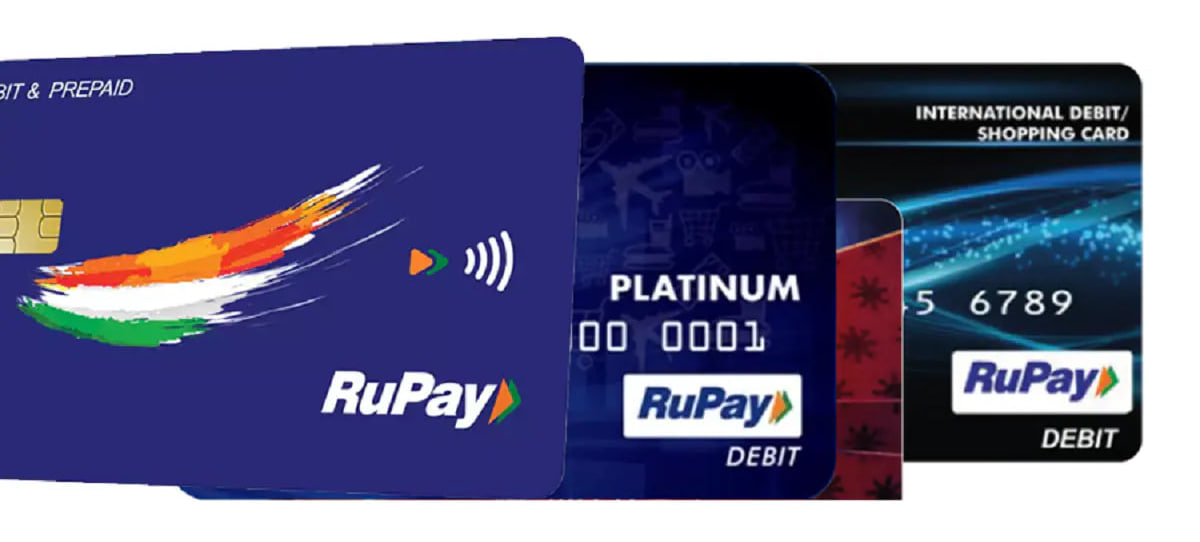
Copyright infringement not intended
Context: The Reserve Bank of India (RBI) has announced a new initiative to enhance the global acceptance and usage of RuPay cards, which are issued by Indian banks. The RBI will allow banks to issue RuPay Prepaid Forex cards to customers who want to travel abroad and make payments in foreign currencies. The RBI will also enable RuPay cards to be issued in other countries, expanding the network of RuPay cardholders and merchants worldwide.
Details
- The RBI governor said that this move will provide more payment options for Indians travelling abroad and will also increase the visibility and recognition of RuPay cards internationally. He said that this is part of the RBI's strategy of internationalising RuPay cards and promoting digital payments and financial inclusion.
- This will also support the Government of India's vision of a digital economy and will boost the economic growth and integration of India with other countries.
- RuPay cards have already gained acceptance in several countries such as Bhutan, Singapore, Nepal, and the UAE, and this has paved the way for more cross-border payment partnerships and collaborations.
- RuPay cards have the potential to become a global payment brand that can foster financial inclusivity and innovation globally.

Rupay Card: A Homegrown Payment Solution for India
- Rupay Card is a payment card system that was launched by the National Payments Corporation of India (NPCI) in 2014.
- It is an indigenous alternative to international card schemes like Visa and Mastercard and aims to reduce the dependency on foreign networks and promote financial inclusion in India.
- The name Rupay is derived from the words rupee and payment and reflects the Indian identity of the card. The logo of Rupay is inspired by the tricolour flag of India and signifies unity, diversity and growth.
- Rupay Card offers various types of cards, such as credit cards, debit cards, prepaid cards, contactless cards and digital cards.
- These cards can be used for online transactions, point of sale (POS) payments, automated teller machine (ATM) withdrawals and BharatQR payments. Rupay Card also has tie-ups with international partners like Discover Financial, JCB and UnionPay to enable global acceptance of its cards.
Some of the features of the Rupay Card are:
Low cost
- One of the main advantages of the Rupay Card is its low cost compared to other card schemes. Since Rupay Card operates on a domestic network, it does not have to pay any royalty or licensing fees to foreign entities, which reduces the processing fees and transaction charges for both cardholders and merchants. This also helps in saving foreign exchange for the country and promoting financial inclusion
High security
- Rupay Card uses state-of-the-art encryption and authentication technologies to ensure secure transactions and prevent fraud. It also adheres to the Reserve Bank of India's (RBI) guidelines on data localization and stores all its data within India, which enhances the data protection and privacy of cardholders.
- Rupay Card has a robust dispute resolution mechanism and a dedicated customer care service to address any issues or grievances.
Wide acceptance
- Rupay Card has a wide network of over 10 lakh POS terminals, 2.6 lakh ATMs and 1.5 crore e-commerce merchants in India, which covers almost all sectors and segments of the economy.
- It also has access to over 40 million POS terminals and 18 lakh ATMs in more than 190 countries through its international partners, such as Discover, Diners Club, JCB and China Union Pay. This enables Rupay Card holders to use their cards globally without any hassle.
Exclusive benefits
- Rupay Card offers various benefits to its cardholders, such as cashback, discounts, reward points, lounge access, insurance coverage and concierge services. These benefits vary depending on the type and category of the card, such as classic, platinum, select or international.
- Some of the benefits include up to 10% cashback on utility bills, up to 25% discount on movie tickets, up to 5% reward points on e-commerce transactions, free lounge access at select airports, personal accident insurance covering up to Rs. 10 lakh and concierge services for travel and hotel bookings.
Rupay Card has several significances for India's economy and society, such as:
Promoting financial inclusion
- Rupay Card enables access to formal banking services for millions of unbanked and underbanked Indians, especially in rural areas.
- It also supports the government's initiatives like Jan Dhan Yojana, Pradhan Mantri Ujjwala Yojana and Ayushman Bharat by providing low-cost and convenient payment solutions.
Boosting digital payments
- Rupay Card encourages the adoption of digital payments among consumers and merchants, thereby reducing cash dependency and enhancing transparency and efficiency.
- It also supports the government's vision of making India a less-cash society and a digital economy.
Strengthening national sovereignty
- Rupay Card reduces India's reliance on foreign payment networks and protects its interests from external influences and threats.
- It also enables India to have more control over its own data and payment policies.
However, Rupay Card also faces some challenges in its growth and expansion, such as:
Competition from other card schemes
- Rupay Card has to compete with well-established and globally recognized card schemes like Visa and Mastercard, which have a larger market share and customer base in India. It also has to contend with emerging players like American Express, Diners Club and UPI.
Awareness and perception issues
- Rupay Card suffers from a lack of awareness and familiarity among some segments of consumers and merchants, who may perceive it as inferior or less reliable than other card schemes. It also has to overcome some misconceptions and myths about its features and benefits.
Infrastructure and innovation gaps
- Rupay Card has to invest more in improving its infrastructure and technology to match the standards and expectations of its customers. It also has to innovate constantly to offer new products and services that cater to the changing needs and preferences of its customers.
The way forward for Rupay Card is to leverage its strengths and opportunities while addressing its weaknesses and threats. Some of the possible strategies are:
Enhancing customer value proposition
- Rupay Card should focus on offering more value-added services and benefits to its customers, such as customized offers, loyalty programs, cash management solutions, etc. It should also improve its customer service and grievance redressal mechanisms.
Expanding customer and merchant base
- Rupay Card should target new segments of customers and merchants, such as youth, women, small and medium enterprises, etc. It should also explore new channels and platforms, such as mobile wallets, e-commerce, social media, etc.
Building brand awareness and trust
- Rupay Card should launch more campaigns and initiatives to educate and inform its customers and merchants about its features and benefits. It should also collaborate with influencers, celebrities, media and other stakeholders to create a positive image and reputation for its brand.
Strengthening international presence and partnerships
- Rupay Card should expand its global footprint and reach by entering new markets and regions. It should also forge more strategic alliances and partnerships with international players to enhance its interoperability and compatibility.

Conclusion
- Rupay Card is a homegrown payment solution that has the potential to transform India's payment landscape and contribute to its economic and social development. It is a symbol of India's self-reliance and innovation, and a source of pride for every Indian.
Must Read Articles:
RUPAY: https://www.iasgyan.in/daily-current-affairs/rupay
|
PRACTICE QUESTION
Q. What are the features and benefits of using a RuPay debit card in India? How does it compare with other payment networks such as Visa and Mastercard? What are the challenges and opportunities for RuPay to expand its market share and customer base? Discuss the way forward for RuPay to become a more competitive and inclusive payment system.
|
https://www.thehindu.com/business/rbi-permits-banks-to-issue-rupay-prepaid-forex-cards/article66947032.ece




